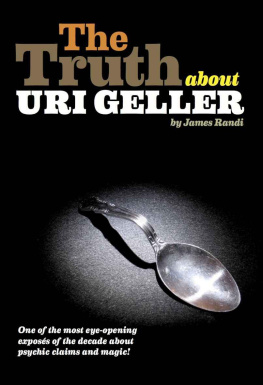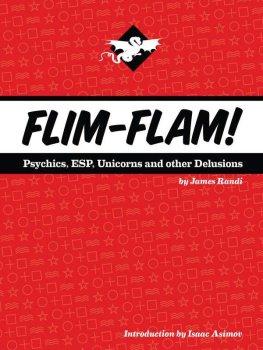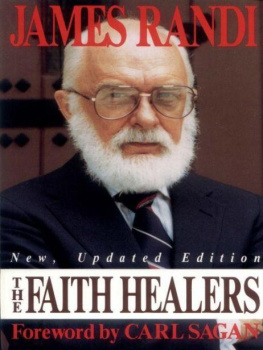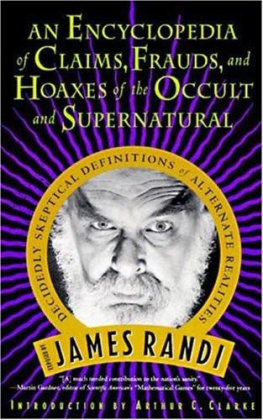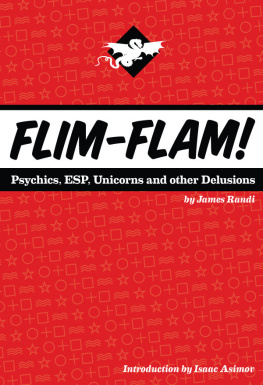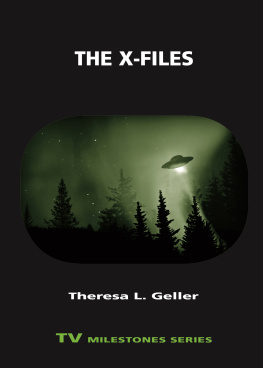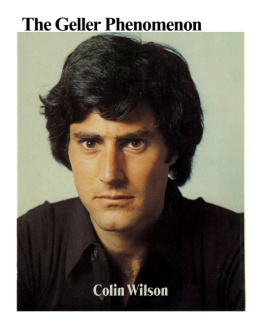James Randi - The Truth About Uri Geller
Here you can read online James Randi - The Truth About Uri Geller full text of the book (entire story) in english for free. Download pdf and epub, get meaning, cover and reviews about this ebook. year: 2011, publisher: James Randi Educational Foundation, genre: Detective and thriller. Description of the work, (preface) as well as reviews are available. Best literature library LitArk.com created for fans of good reading and offers a wide selection of genres:
Romance novel
Science fiction
Adventure
Detective
Science
History
Home and family
Prose
Art
Politics
Computer
Non-fiction
Religion
Business
Children
Humor
Choose a favorite category and find really read worthwhile books. Enjoy immersion in the world of imagination, feel the emotions of the characters or learn something new for yourself, make an fascinating discovery.
- Book:The Truth About Uri Geller
- Author:
- Publisher:James Randi Educational Foundation
- Genre:
- Year:2011
- Rating:3 / 5
- Favourites:Add to favourites
- Your mark:
- 60
- 1
- 2
- 3
- 4
- 5
The Truth About Uri Geller: summary, description and annotation
We offer to read an annotation, description, summary or preface (depends on what the author of the book "The Truth About Uri Geller" wrote himself). If you haven't found the necessary information about the book — write in the comments, we will try to find it.
James Randi: author's other books
Who wrote The Truth About Uri Geller? Find out the surname, the name of the author of the book and a list of all author's works by series.
The Truth About Uri Geller — read online for free the complete book (whole text) full work
Below is the text of the book, divided by pages. System saving the place of the last page read, allows you to conveniently read the book "The Truth About Uri Geller" online for free, without having to search again every time where you left off. Put a bookmark, and you can go to the page where you finished reading at any time.
Font size:
Interval:
Bookmark:
AUTHORS NOTE
ACKNOWLEDGMENTS
FOREWORD
INTRODUCTION: WHO IS URI GELLER?
HOW DOES URI DO IT?
ABOUT THE SRI REPORT
WHAT DOES IT ALL MEAN?
ANDREW WEILS SEARCH FOR THE TRUE GELLER
THE MAN WHO DISCOVERED URI GELLER
THE TIME MAGAZINE EPISODE WITH GELLER
THE WONDERFUL TELEPORTATION TO AND FROM BRAZIL... OR HOW NOT KNOWING ENOUGH ABOUT THE SUBJECT CAN BE VERY EMBARRASSING
PHOTOGRAPHS THROUGH A LENS CAP
THE PERSONS BEHIND THE GELLER MYTH
THE SPANIARD WITH THE X-RAY EYES
THE OLD BROKEN-WATCH TRICK REVEALED
HE DIDNT FOOL THEM IN ISRAEL!
ALAN SPRAGGETT THROWS DOWN THE GAUNTLET, THEN THE TOWEL
GELLERS MAJOR AMERICAN TV APPEARANCES
GELLER IN ENGLAND
A CENTURY AGO: SAME GAME, DIFFERENT PERSONNEL
THE MAGICIANS ATTITUDE AND HOW IT CHANGED
CONCLUSION: WHAT GELLER HAS DONE, AND WHERE HE CAN GO FROM HERE
OBJECTIONS TO THIS BOOK
APPENDIX
GLOSSARY
BIBLIOGRAPHY
ABOUT THE AUTHOR
ABOUT THE JREF



Dedicated to Uri Geller and Shipi Shtrang, two men who fooled the worldalmost
Ill have you hanged, said a critical and ignorant king, who had heard of The Psychics Powers, if you dont prove that you are a mystic.
I see strange things, said The Psychic at once. A golden bird in the sky, and demons under the earth.
How can you see through solid objects? How can you see far in the sky?
Fear is all you need.
AUTHORS NOTE
Since this book was first published in 1975 under the title The Magic of Uri Geller, much has occurred in the Geller saga. I will attempt to bring the reader up to date.
I have not revealed this previously, but it is surely time to do so. In May of 1975, just before the book was committed to the hands of the printer, I sent Uri Geller a registered, carefully composed letter. It was received by him personally at his apartment in New York City.
The letter offered Geller a way to ward off the dilemma that my book was sure to bring about. I told him that I would meet with him at a time and place of his choosing to discuss what we might work out so that I would not have to proceed with publication. It was something I was willing to forgo if a better solution could be arrived at, but I was convinced that the truth had to be told, one way or another. Though I did not say in the letter what offer I would make, I was prepared to accept a statement from Uri to the effect that he had performed his deceptions in order to show that scientists are easily fooled and that the media are inclined to snap up every paranormal claim they can find, uncritically. In other words, I was offering him a way out that would not only make him a hero and a prince of hoaxers, but also pave the way for him to step into legitimate show business as an established conjuror.
He could have avoided the albatross I was about to hang about his neck, the book would be the official announcement of his revelation to the world, and wed all be a lot happier.
Knowing the business as I do, I have no doubt that this man could have rescued himself and become a huge success in the theater had he chosen to accept my offer of that private talk. He chose not to, and the manuscript went to the printer.
Weeks before the book was released, I received two letters, both from the same lawyer, on behalf of Geller and two scientists who had tested and validated his powers. The letters stated that, if I made any untrue statements about these individuals, I would be sued for libel. Fair enough. In order to prove libel, a plaintiff has to prove that an untrue statement was made. Obviously, every statement in this book was carefully read and considered by that lawyer. I was never sued.
In March of 1977, I received a letter from Yascha Katz, Gellers former manager, offering to discuss the matter with me. I had referred to him as a dupee rather than as a duper, and he found that to be a suitable premise upon which he might approach me. Enlisting the interest of the Italian RAI television folks, who had just completed a lengthy and very negative study of paranormal claims through journalist Piero Angela, I flew to Israel to interview Katz. What he told me was the single greatest indictment of Uri Geller Id ever heard. This former colleague claimed that Geller owed him upwards of $30,000 in unpaid commissions and that he (Katz) had been dumped after Geller got his start in the United States. He described the scene at the airport in Tel Aviv when he and Geller were boarding the plane to America. Katz had asked, one final time, if his apparent powers were the real thing or a deception. Uri had looked into his eyes and sworn it was all kosher, and the two had walked hand-in-hand up the ramp.
Katz described how he had then been dragooned into serving as a confederate in the Geller vaudeville act, peeking into sealed envelopes, tossing objects over his shoulder as materializations credited to Geller, and listening in on conversations to obtain needed information for the deceptions. He had done this when his regular confederates, Shipi Shtrang and others, had been unavailable.
The expose was broadcast in Italy and published in New Scientist magazine in England. Geller then loudly proclaimed that Katz had stolen money from him, and Katz countered by announcing that he was suing Geller. Nothing ever happened. Ever since, the popularity of this psychic superstar has been waning. Most of the scientists who formerly supported him jumped off his comet as it dimmed. Others have simply lapsed into silence on the subject. The Stanford Research International folks merely grumble that Geller was only 3 percent of the total work they carried out in the paranormal field and declined to discuss the matter furtherexcept to insist that they were not fooled in the first place. Harold Puthoff and Russell Targ have contradicted themselves. They said early on in the drama that if they ever even suspected a subject of using trickery, they would throw him/her out on his/her ear. Now they confide that they knew all the time Geller was a trickster but wanted to study his methods!
John Taylor, formerly Gellers most vocal and dedicated supporter, has written a book, Science and the Supernatural, in which he does a 180-degree turn at high speed without academic whiplash, reversing himself on the matter in a rather peculiar fashion. He tells us that since only the electromagnetic (EM) spectrum can explain Gellers featsif they are genuineand his research shows that EM forces are not involved, therefore the phenomena do not exist. What we look for in vain is a statement from Taylor admitting that he was fooledcompletely, thoroughly, and definitively. But the raw courage it took to write the book, preceded as it was by rather tame articles in scientific periodicals that hinted at the reversal to come, can earn only praise from my camp.
John Hasted continues to believe in Geller, the spoon-bending children, and almost everything paranormal, in spite of a plethora of rebuttals, denials, and criticisms of his claims. Charles Crussard, still convinced that he was and is incapable of error, labors on in France to convince the world that he was right in believing in the powers of Geller and of his own Gallic star, Jean-Pierre Girard. Crussard seems not to be aware that Girard long ago declared, as I thought Geller might choose to, that he was playing psychic as a hoax on the scientists.
Next pageFont size:
Interval:
Bookmark:
Similar books «The Truth About Uri Geller»
Look at similar books to The Truth About Uri Geller. We have selected literature similar in name and meaning in the hope of providing readers with more options to find new, interesting, not yet read works.
Discussion, reviews of the book The Truth About Uri Geller and just readers' own opinions. Leave your comments, write what you think about the work, its meaning or the main characters. Specify what exactly you liked and what you didn't like, and why you think so.

